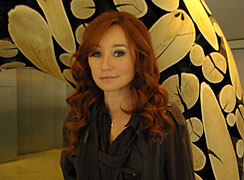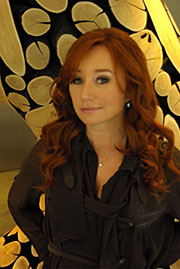AVIVA-Berlin >
Interviews
AVIVA-BERLIN.de im Februar 2026 -
Beitrag vom 13.10.2011

Interview with Tori Amos
Britta Meyer, Sharon Adler
She plays the piano like an earthquake, sings about the antichrist in her kitchen and writes the most cryptically poetic lyrics: Singer/Songwriter Tori Amos met with AVIVA during her short visit...
... to Berlin, where she performed at the Tempodrom and talked about her Irish origins, the triple goddess, shapeshifters, a woman`s journey to self reflection and office bullying in the 21st century.
AVIVA-Berlin: In your new album "Night of Hunters", you explore the myths of ancient Ireland. You used Celtic choirs in your former album, "The Beekeeper".
What are your connections to Celtic mythology?
Tori Amos: I started reading about it when I was twelve years old. I was drawn to it without explanation. Maybe it was to escape. I was in a religious household, and there were so many biblical stories that we talked about and you did not really have a choice. It`s not like you were tied up and beaten, but you could not escape christianity or even the Old Testament stories. So that`s what I was surrounded by. Mythology was something that would be allowed in the house, because it was educational. Libriaries, they would have a section in mythology and I would be able to check out books and so I had books all the time. I was obsessed with them. Until this day I have a really good library in Florida. So, that was the beginning, and when I grew and traveled, I would be exposed to more books. Once, when I was in my early twenties, I went to Los Angeles, there were books I had never even be exposed to. I began buying and collecting them, everything about mythology, anything I could get my hands on, even archaelogical texts about things they were discovering about the culture. Then my mother had been doing work on the family tree because she knew of her Native American heritage, she had tracked down our Eastern Cherokee Nation heritage. My sister went to medical school on a scholarship because of her Native American heritage. My mother then decided to check out my father`s tree and met somebody at a family gathering who had done the whole line on my father`s side. She then realised that there was an Irishman called John Craig, who had left Ireland around 1730. He came to America and he fought in the revolutionary war. He had been in County Cork. The house that the story of my new album takes place in, and which I bought in 1995 is from 1735. I always had a connection with this Irish ancestor which had left County Cork around the time when the house was built and in my mind I felt like I was drawn to go back there and I did.
AVIVA-Berlin: You produced "Night of Hunters" with a new label and with a complete new set of musicians. What made you change your former combination of co-musicians?
Tori Amos: When the musicologist Dr. Alexander Buhr approached me, it`s such a different project than anything I have ever done, you really had to think about it, with the engeneering team, with my husband Mark Hawley. Mark and I sat down with Alex and talked about it from the theoretical point of view, how it would work. When you pursue a project, if you think about it in your mind, it`s a clean slate, everything is open to you, but then you`ll have to start making really rational decisions that make sense creatively. Mark really insisted that it had to be an accoustic record. We did not want a rock record, progressive, classical/rock fusion. Deutsche Grammophon did not want that either, so we were on the same page about what it could not be. Then we started focusing, because there were ideas, put up by a think tank, that we could do some really strange effects and this kind of thing and Mark was vehemently against that, he said: "It would be much more modern, if we don`t bring any electronic instruments into this." We were bringing an amazing gear and it was recorded with the most modern equipment that we have, we had access to great technology, but we were not going to use any digital gags. We had been listening to Stravinsky and we felt that we needed an intimacy to tell the story. Then we started narrowing down what the elements needed to be. The musicians had to be from the classical world because we needed that sensibility. I was doing variations on the themes and they needed to know the original pieces and be familiar with was that was so that they could come into our story and have that in them. The composition itself, in the way it was constructed, was making them change anyway, but I wanted them to have the language of the original piece in their blood and that is not a pop musician. Matt Chamberlain is probably one of the greatest drummers in the whole world, but we made the decision not to have drums, that the rhythm would have to come from the piano itself.
AVIVA-Berlin: On "Night of Hunters", your daughter Tash and your nineteen-year-old niece sing the parts of Anabelle and the Fire Muse. How come they performed with you and what does it mean to you?
Tori Amos: When we decided that it would be a 21st century song cycle, I started thinking "21st century, what does that mean?" It means that I wanted a female protagonist and that it needed to be about her mental process, opposed to the mental process of a man, I thought "Let`s follow the woman`s story!". We also needed a mystical element. I was familiar with the triple goddess, the idea from Ireland of the Maid, the Mother and the Crone. I liked the idea of two other female energies, along with the woman that I played. That was constructing a subtle relationship with the triple goddess, the Fire Muse being the Mother aspect, my character being the Crone aspect and the Maiden being little Tash (her daughter, editorôÇs note). That was one idea of the Triad and then it seemed as well that we needed a shapeshifting creature, because shapeshifting is something that happens a lot in Irish mythology. It seemed to me that we needed to have a child representing nature and yet being ancient and timeless. I was watching Tash act, she has been acting for a while and I was watching her process. The guy I had been working with at the National Theatre in Britain for the musical said to me: "She can do this, she can play this role if you design it right". He had seen her doing preparations for a monologue to get into Sylvia Young, a performing art school in London, which she got into. Once I was looking at her not through a mother`s eyes but through producer`s eyes I saw that she would be able to professionally handle it. Then I started to design it around her and she started building Anabelle with me. I always knew that my niece could energetically play the Fire Muse. She is nineteen, so she is in a different stage in her development. The two of them have a great relationship, so I thought energetically, it could work.
|  |
ôˋ Sharon Adler |
AVIVA-Berlin: You once called "Tales of a Librarian" as your musicial autobiograpy ã how would you describe your latest album "Night of Hunters"?
Tori Amos: I think it`s every woman`s story. I think women really go through an emotional process that is very unique to them. I talk a lot to men on the crew and when we are traveling. I also see through my husband`s eyes, he`ll look at me and say:
"How do you all think things through? Just give me an Arsenal game, I will get on my motorbike, come back, watch Formula 1 and I`ll work it out." I think women do have a very different way of working through conflicts and confrontations and relationships. I wanted to crawl into the process that a woman goes through when everything falls apart. When I was building this whole thing, I found that the men were very curious about how to get into a woman`s mind, to see how it works. (laughs) Not all of them, but it is foreign to quite a few of them. I really wanted to investigate and to put the work together, I felt like this was going to represent the 21st century. When you go on these psychological journeys, they take you deep into a place and it is enhanced because of the elixir you are taking. Native Americans have their own form of peyote, which also is in the story, where Anabelle gets the woman to take this mental, spiritual, emotional and physical journey, whereby it opens her up to things and ideas that she had completely shut off. I needed this woman to expand and grow in just one night and to be able to go back to other lifetimes and to gather parts of her soul. So, in a way it is very much about a spiritual journey for a woman to make and I felt that the 21st century could handle the idea of going back to other lifetimes, the idea that there are pieces of yourself that sometimes you have to collect. The idea that this couple could have been together one time and not brutalize each other verbally as they ended up doing at the beginning of the story.
AVIVA-Berlin: Sexual politics, equal rights, morality and religion have always been important issues of your work. You once sang about feminism and the struggle for equal rights
"time to get scared - time to change plan, don`t know how to treat a lady, don`t know how to be a man".What is your main philosophy on how to be a feminist today?
|  |
ôˋ Sharon Adler |
Tori Amos: I think you need not to get hung up on what you call yourself, well, not "you", but "us". I am careful about using the word "feminist" and I feel that my actions and what I believe in can affect people around me and the people that I am working with. There are some women that I find to be chauvinist pigs. I have been exposed to people that came to the shows and talked to me about office bullying for example. Sometimes it is the woman that is there, bullying women and men, because they have become part of this patriarchy authority. We know that women can abuse their power. But they are not feminists. That is the amazing thing in my mind, they call themselves that! So, what I have tried to do is getting away from terminology and to be more about an expansive view of human rights, individual rights. It has shocked me that in the 21st century there is still this kind of behaviour, if you are in a powerful position. Not everybody is like this; there are some people in powerful positions that treat people really well. They are at the top and sometimes they treat people better than the middle management people! I have heard so much of this in the last year that I don`t know how it is going to develop in my next work, but it is really something that has woken me up to the fact that in a civilised, professional environment there are still these primitive behaviours, to feel powerful, you have to make someone else feel demeaned. It is just so barbaric that sometimes I`d like to get a hold of these people, men or women, and I don`t know what I`d do with them?
AVIVA-Berlin: Something barbaric?
Tori Amos: (laughs) Show them films of themselves! I wish people could really look at themselves. I think that is what Anabelle in the story is trying to get the woman to do, to look at herself. How do you gain self awareness? You have to want it. You have to want to look. It is cringing sometimes, scary, for any of us, to look at ourselves. It is a painful process, but also that`s how change happens.
AVIVA-Berlin: Thank you very much and all the best!
Tori Amos: Thank
you!Read more at AVIVA-Berlin:Our review of
Tori Amos - Night of Hunters